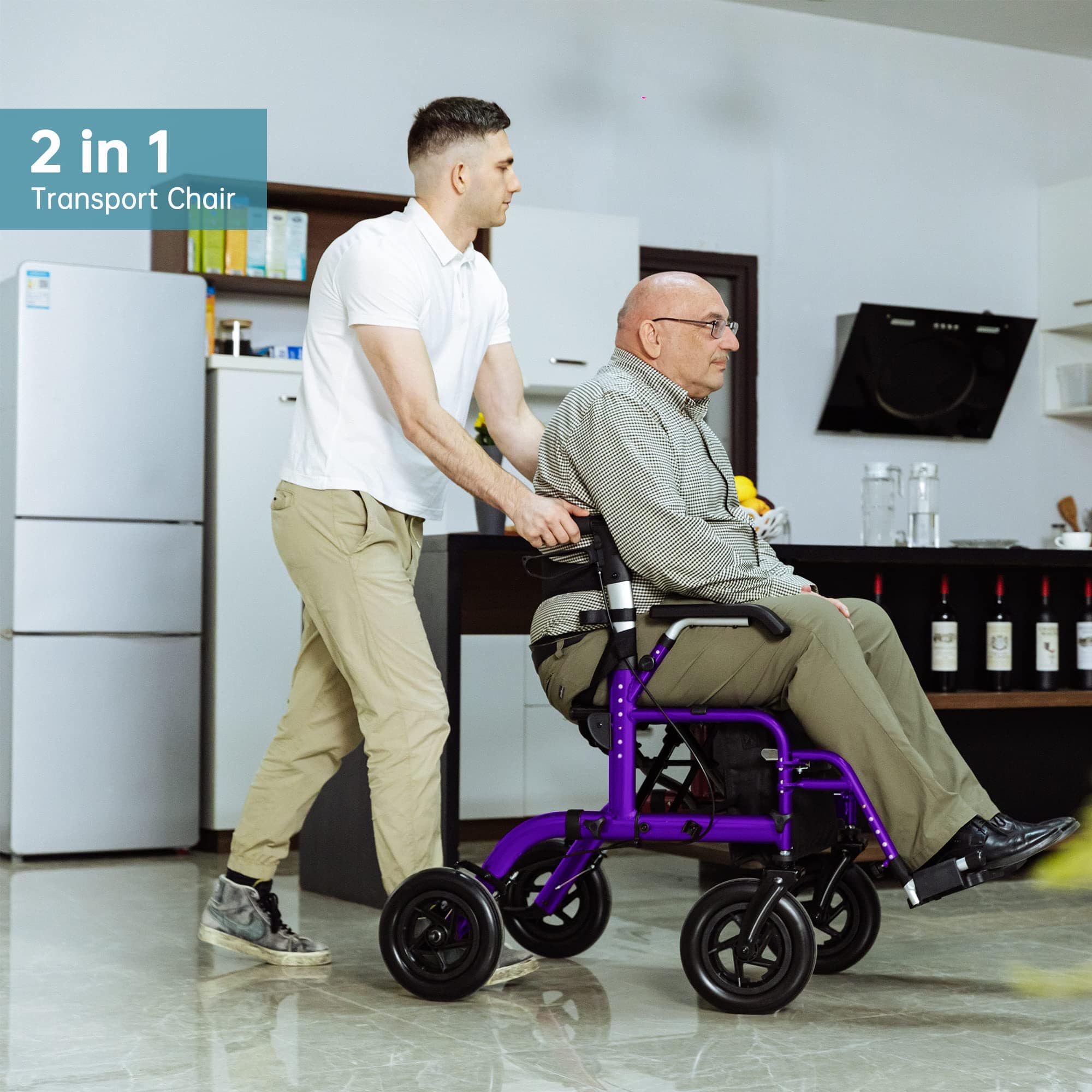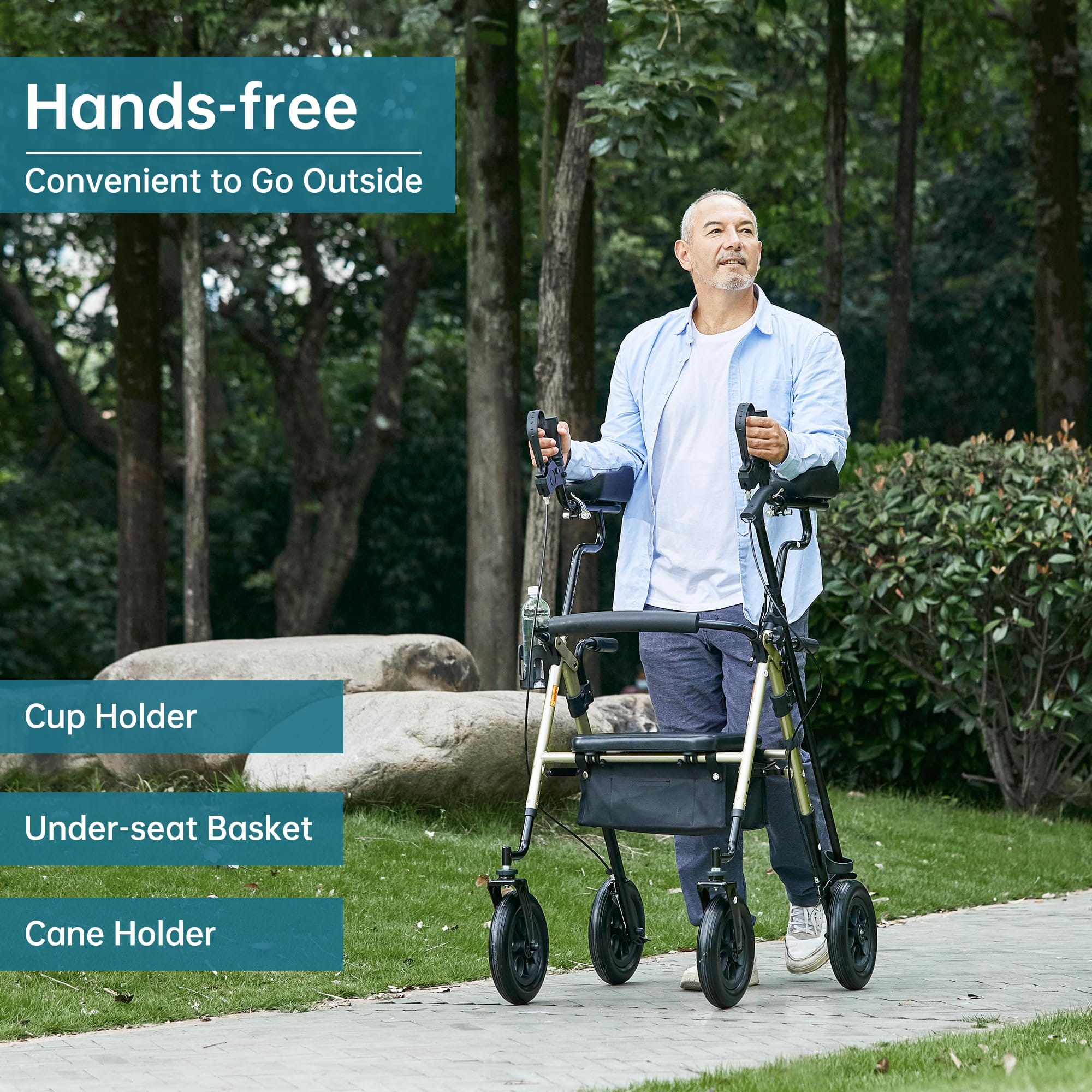Are Rollator Walkers Recommended for People with Neuropathy?
May 06, 2025
Dealing with neuropathy isn’t easy. Whether it’s tingling, numbness, weakness, or straight-up pain in your legs and feet, it can make something as simple as walking to the mailbox feel like climbing a mountain. For people with neuropathy, the fear of falling is always kind of hanging around in the back of your mind, and that’s no way to live.
But the good news? There are tools out there that can help make walking safer, more comfortable, and way less stressful. One of the best options? Rollator walkers. They’ve become super popular, and for good reason. Let’s talk about why they’re often recommended for people with neuropathy, how they help, and what kind of features to look for.
Why Mobility Can Be a Struggle with Neuropathy
Before we get into walkers, it helps to understand why walking gets so tricky with neuropathy. Neuropathy affects your nerves—usually in your legs and feet. That means your body has a harder time sensing the ground beneath you, and your balance can feel totally off. Add in pain, weakness, or that weird pins-and-needles sensation, and it makes walking not only hard, but also risky.

When you can’t trust your own feet, every step starts to feel uncertain. It’s exhausting, and it can make you want to just sit still. But here’s the thing—staying mobile is actually one of the best things you can do. And that’s where rollator walkers really shine.
Why Rollator Walkers Are a Solid Choice for People with Neuropathy
So, why are rollator walkers recommended for people with neuropathy? In short: they offer stability, safety, and comfort all in one package. Instead of feeling like you might topple over at any moment, you’ve got something sturdy to lean on.
Here’s what makes them such a good fit:
1. Support for Balance Issues
Neuropathy often throws off your balance. With a rollator walker, you’ve got a reliable base to steady yourself. It gives your body and your brain a chance to relax a bit, knowing there’s something there to catch you if you start to wobble.
2. Easy to Use
Most rollators come with four wheels and brakes, making them super easy to steer and stop when needed. This is especially helpful if neuropathy affects your grip or hand strength.
3. Built-in Seat When You Need a Break
One of the best features of a walker with wheels and seat is just that—the seat. When your legs start feeling like jelly, you don’t have to hunt for a bench. Just lock the brakes, sit down, and rest for a minute. It makes outings feel less overwhelming.
HFK-9211 ELENKER Rollator Walker Shock Absorbing Carrying Bag
4. Customizable for Your Needs
From lightweight aluminum frames to padded backrests and even storage pouches, rollator walkers can be as basic or fancy as you want. Some even convert into a walker wheelchair combo, which is super handy if you want the option to be pushed when you're too tired to walk.

Elenker HFK-9213-5 All-Terrain 2 in 1 Rollator Walker that change Rollator Walker to Transport Chair
Why the Right Walker Matters
Not all walkers are created equal, though. For people with neuropathy, a basic two-wheeled walker might not offer enough support or convenience. You want something more stable and comfortable—something that feels like it’s working with you, not against you.
A 4 wheel walker with seat gives you solid support and great mobility. It’s perfect for indoor use and holds up well outdoors too, especially on smoother surfaces. And for folks who want to maintain good posture, upright walkers for seniors are a great option. These let you walk standing more upright instead of hunched over, which can reduce back and shoulder pain.
Shoutout to the Elenker Rollator Walker
One model worth checking out is the Elenker rollator walker. A lot of folks really like it because it hits that sweet spot between affordability and functionality. It’s lightweight, easy to fold up, and it comes with a comfortable seat, adjustable handles, and big wheels that roll smoothly on different surfaces.
They even have versions that fall into the upright walkers for seniors category, which help promote better posture and reduce strain on the back and arms. If you’ve got neuropathy and need something reliable to get around the house or even out and about, Elenker might be worth a look.

HFK-9236T4 ELENKER Upright Rollator Walker
Things to Keep in Mind When Picking a Rollator
If you’re shopping around for a rollator walker, here are a few tips to help you choose the right one:
Handle Height: Make sure the handles can be adjusted to match your height. You don’t want to hunch over or reach too high.
Wheel Size: Larger wheels are better for outdoor use or uneven sidewalks. If you mostly use it indoors, smaller wheels are fine.
Seat Comfort: Try the seat out if you can. Some are padded and some aren’t. If you’ll be sitting a lot, you’ll want one that feels good.
Weight Capacity: Make sure the walker is rated for your body weight to ensure it’s safe and stable.
Storage Options: Many rollators come with a storage pouch or basket, which is perfect for carrying water, a phone, or your medications.
Don’t Wait Until You Fall
A lot of people with neuropathy wait too long to get a walker because they don’t want to “give in” or feel like they’re losing independence. But here’s the truth: using a rollator isn’t giving up. It’s leveling up. You’re making a smart choice to stay active and avoid injuries.
Falling can cause serious problems, especially if you’re older or already have health concerns. So if you’re even thinking about getting a walker, that’s probably a sign you could benefit from one. Talk to your doctor or physical therapist—they can help you choose the right model for your needs.
So, are rollator walkers recommended for people with neuropathy?
Absolutely.
They provide the balance support, comfort, and confidence you need to stay on your feet and keep moving forward. Whether you’re taking a stroll through the grocery store, walking the dog, or just getting around the house, having a sturdy, reliable rollator can make all the difference.
From the classic walker with wheels and seat to high-tech models like the Elenker rollator walker or upright walkers for seniors, there’s definitely something out there that can help you move with more ease and less fear.
You don’t have to tough it out alone. The right walker is like a good friend—it’s there when you need it and makes life a little easier every day.











